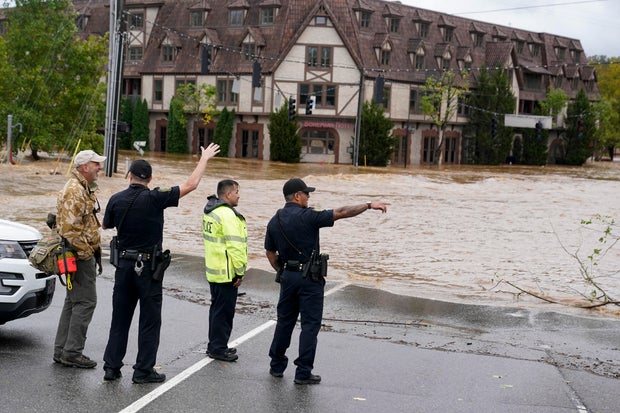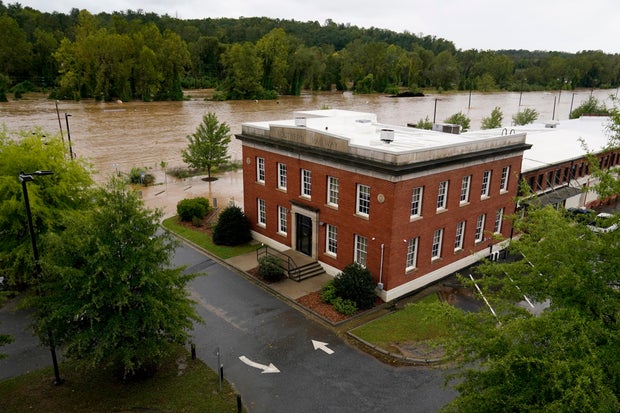Floodwaters pushed by the remnants of Hurricane Helene left North Carolina's largest mountain city largely cut off Saturday by damaged roads and a lack of power and cellphone service, part of a swath of destruction across southern Appalachia that left an unknown number dead and countless worried relatives unable to reach loved ones.
In North Carolina alone, more than 400 roads remained closed on Saturday as floodwaters began to recede and reveal the extent of damage. North Carolina Gov. Roy Cooper said that supplies were being airlifted to that part of the state.
At least ten people have been killed by Helene in North Carolina, CBS News has confirmed, among a total death toll of at least 63 people across multiple states.
Among those rescued from rising waters was nurse Janetta Barfield, whose car was swamped on Friday morning as she left an overnight shift at Asheville's Mission Hospital. She said she watched a car in front of her drive through standing water and thought it was safe to proceed. But her car stalled, and within minutes water had filled her front seat up to her chest. A nearby police officer who saw her car stall helped her to safety.
"It was unbelievable how fast that creek got just in like five minutes," Barfield said.
Early on Saturday morning, many gas stations were closed because they didn't have electricity, and the few that were open had hourlong lines wrapped around the block. The hub of tourism and arts, home to about 94,000 people, was unusually still after floodwaters swamped neighborhoods known for drawing visitors including Biltmore Village and the River Arts District, which is home to numerous galleries, shops and breweries.
More than 700,000 power customers were without power across North Carolina, including 160,000 in Buncombe County. Interstate 40 and I-26 were impassible in multiple locations, and a state transportation department map showed that most routes into Asheville and across much of the mountains were snarled. North Carolina's Department of Transportation posted on social media on Saturday afternoon that "all roads in Western North Carolina should be considered closed."
In Asheville, there was no cellular service and no timeline for when it would be restored.
"We have had some loss of life," County Emergency Services Director Van Taylor Jones told reporters. However, he said they were not ready to report any specifics. Officials have been hindered in contacting next of kin by the communications outages. Asheville police instituted a curfew from 7:30 p.m. Friday to 7:30 a.m. Saturday.
"The curfew is to ensure the public's safety and will be in effect until further notice," police said.
Asheville transit services were also suspended, police said. The city advised residents to boil "all water used for human consumption," as there was at least one significant water line break during the storm. Many residents might not be getting water or reduced or no pressure water.
Jones said the area experienced a cascade of emergencies that included heavy rain, high winds and mudslides. Officials said they tried to prepare for the storm but its magnitude was beyond what they could have imagined.
"It's not that we (were) not prepared, but this is going to another level," Sheriff Quentin Miller said. "To say this caught us off-guard would be an understatement."
Atlanta resident Francine Cavanaugh said she has been unable to reach her sister, son, or friends in the Asheville area.
"My sister checked in with me yesterday morning to find out how I was in Atlanta," she said on Saturday. "The storm was just hitting her in Asheville, and she said it sounded really scary outside."
Cavanaugh said her sister had no idea how bad the storm would be there. She told Cavanaugh she was going to head out to check on guests at a vacation cabin "and that's the last I heard of her. I've been texting everyone that I know with no response. All phone calls go directly to voicemail."



